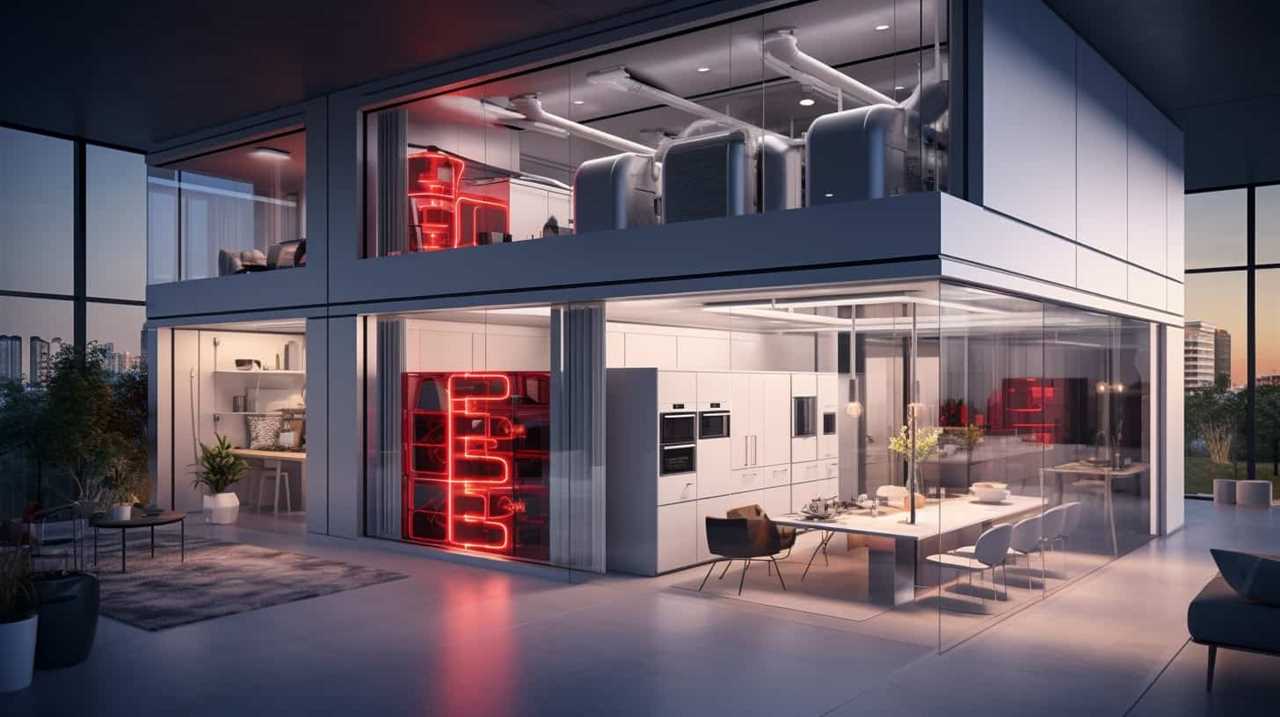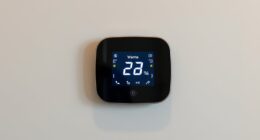Ready to turn your home into a cozy oasis? Look no further! Check out our top tips for maximizing the efficiency of your heat pump HVAC system.
With our expert advice, you’ll learn how to choose the right size heat pump, maintain optimal efficiency, and save energy through proper insulation.
Plus, we’ll show you how to maximize efficiency with programmable thermostats.
Get ready to transform your home into a haven of comfort and savings!

Key Takeaways
- Proper sizing is crucial for optimal performance and efficiency of heat pump HVAC systems.
- Consulting with a professional HVAC contractor is recommended for accurate sizing and installation.
- Properly sized heat pumps lead to cost savings, low utility bills, and reduced environmental impact.
- Regular maintenance by professionals and DIY techniques can enhance performance, extend the lifespan, and reduce energy consumption of heat pump systems.
Understanding Heat Pump HVAC Systems
Let’s dive into understanding heat pump HVAC systems and how they work.
Heat pump technology is a highly efficient way to heat and cool your home. Unlike traditional HVAC systems that rely on burning fuel or generating heat electrically, heat pumps transfer heat from one area to another using a refrigerant.
During the heating season, the heat pump extracts heat from the outside air, even in temperatures as low as -15 degrees Fahrenheit, and transfers it into your home. In the cooling season, the process is reversed, and the heat pump extracts heat from your home and releases it outside.
This technology offers several benefits, including energy efficiency, cost savings, and environmentally friendly operation. By understanding how heat pump systems work, you can make informed decisions about your HVAC needs.

Choosing the Right Size Heat Pump for Your Home
When choosing the right size heat pump for our homes, proper sizing is crucial for optimal performance and efficiency. It’s important to consider energy efficiency ratings, such as the Seasonal Energy Efficiency Ratio (SEER) and Heating Seasonal Performance Factor (HSPF), to ensure we’re getting the most efficient heat pump for our needs.
Additionally, selecting the right size heat pump can have a significant impact on our utility bills, as an oversized or undersized unit may lead to wasted energy and higher costs.
Proper Heat Pump Sizing
We recommend properly sizing your heat pump to ensure optimal performance and energy efficiency in our homes. Choosing the right size heat pump is crucial for efficient heat pump installation and troubleshooting. A heat pump that is too small will struggle to adequately heat or cool your home, while a heat pump that is too large will cycle on and off frequently, wasting energy and reducing its lifespan. To determine the correct size for your heat pump, it is important to consider factors such as the climate in your region, the size of your home, and its insulation levels. Consulting with a professional HVAC technician can help you accurately assess your heating and cooling needs.
| Factors to Consider | Sizing Considerations |
|---|---|
| Climate | Hotter climates may require larger heat pumps |
| Size of Home | Larger homes may require higher capacity |
| Insulation Levels | Well-insulated homes may require less capacity |
| Existing Ductwork and Ventilation | Proper airflow is essential for efficiency |
| Desired Heating and Cooling Levels | Extra capacity may be required for comfort |
Proper heat pump sizing is just the first step towards achieving energy efficiency in your HVAC system. Now, let’s explore some important energy efficiency considerations to further optimize the performance of your heat pump.
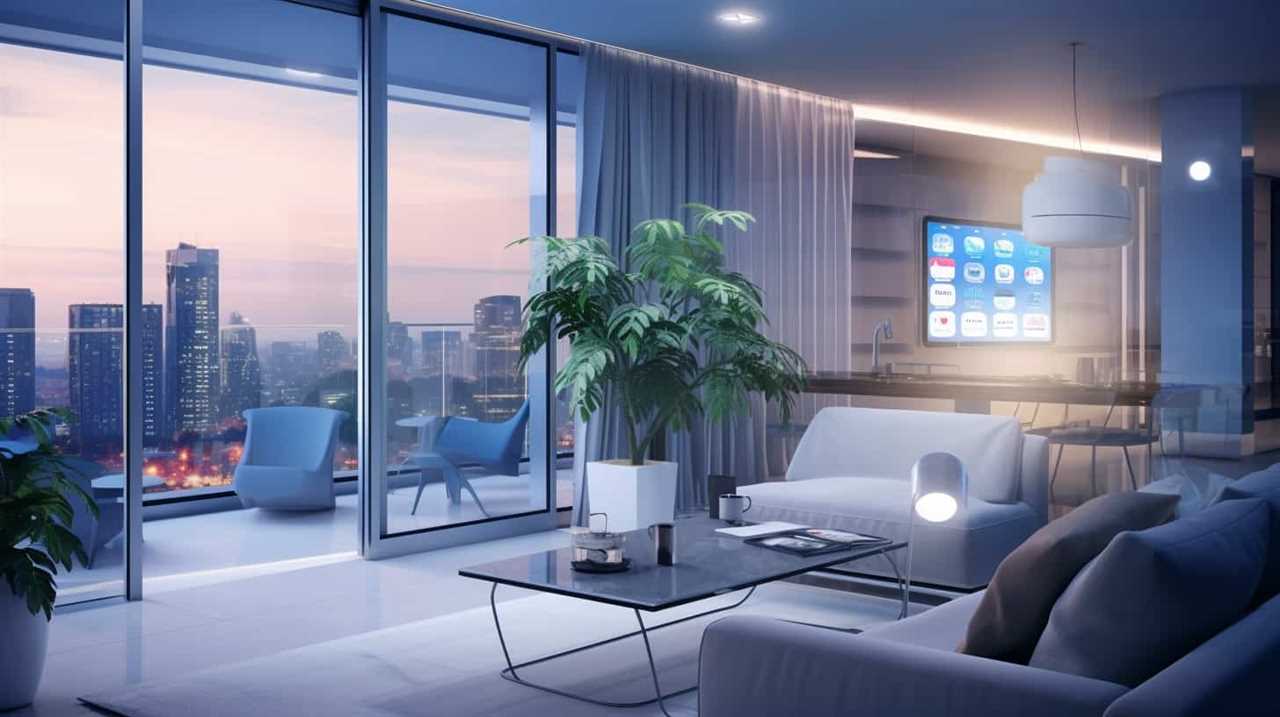
Energy Efficiency Considerations
To ensure energy efficiency, we must carefully choose the right size heat pump for our homes. Proper sizing is essential for maximizing the benefits of heat pump technology and implementing energy saving techniques.
A heat pump that’s too large for our home will cycle on and off frequently, leading to energy wastage and reduced efficiency. Conversely, a heat pump that’s too small will struggle to meet our heating and cooling needs, resulting in increased energy consumption.
By accurately calculating the heating and cooling loads of our homes, we can determine the appropriate size of the heat pump required. Factors such as insulation levels, square footage, and climate conditions should be considered to ensure optimal performance and energy efficiency.
Consulting with a professional HVAC contractor is recommended to accurately size our heat pump and achieve the desired energy savings.
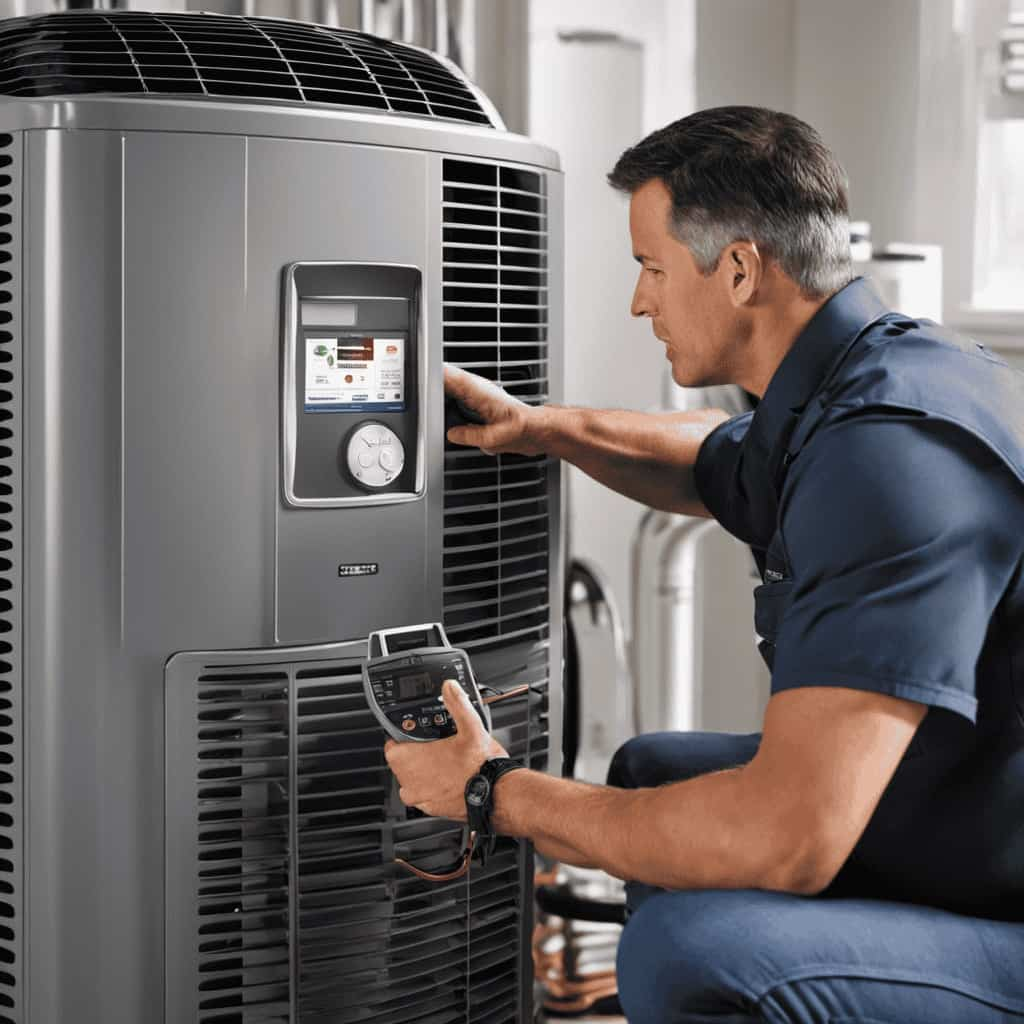
Impact on Utility Bills
The proper sizing of a heat pump has a significant impact on our utility bills. Choosing the right size heat pump for our homes can lead to cost savings and reduce the impact on the environment. When a heat pump is too small for the space it is trying to heat or cool, it will work harder and consume more energy, resulting in higher utility bills. On the other hand, an oversized heat pump will cycle on and off frequently, wasting energy and causing unnecessary wear and tear on the system.
To illustrate the impact of proper sizing on utility bills, consider the following table:
| Heat Pump Size | Utility Bills |
|---|---|
| Undersized | High |
| Oversized | High |
| Properly sized | Low |
As shown in the table, choosing a properly sized heat pump can lead to lower utility bills, resulting in cost savings and a reduced environmental impact.
Regular Maintenance for Optimal Heat Pump Efficiency
Maintaining regular maintenance for your heat pump is crucial in ensuring optimal efficiency. Hiring a professional for servicing is essential as they have the expertise to identify and address any potential issues.

However, there are also DIY maintenance techniques that homeowners can perform to keep their heat pumps running smoothly and efficiently.
Importance of Professional Servicing
We highly recommend scheduling professional servicing for your heat pump HVAC system to ensure optimal efficiency.
Here are some key reasons why professional maintenance is so important:
-
Enhanced Performance: Regular professional servicing helps your heat pump HVAC system perform at its best, ensuring maximum efficiency and comfort.

-
Increased Lifespan: Professional technicians can identify and address any potential issues early on, preventing major breakdowns and extending the lifespan of your system.
-
Energy Savings: A well-maintained heat pump operates more efficiently, consuming less energy and reducing your utility bills.
By investing in professional servicing, you can enjoy the benefits of improved performance, increased lifespan, and energy savings.
Don’t overlook the importance of regular maintenance for your heat pump HVAC system; it can make a significant difference in its overall efficiency and longevity.

DIY Maintenance Techniques
Let’s start by outlining some effective DIY maintenance techniques to ensure optimal heat pump efficiency.
DIY troubleshooting can help you identify and resolve common heat pump issues, saving you time and money. One common problem is a dirty air filter, which can reduce airflow and strain the system. Regularly cleaning or replacing the air filter can improve heat pump performance.
Another issue is a dirty outdoor unit, which can impede heat transfer. Clearing away debris, such as leaves and dirt, from the outdoor unit can enhance heat pump efficiency.
Additionally, checking and cleaning the indoor and outdoor coils can prevent blockages and maintain proper heat transfer.

Finally, inspecting the ductwork for leaks and sealing any gaps can optimize airflow and ensure efficient operation.
Setting the Ideal Temperature for Energy Savings
To maximize energy savings, it’s important to set the ideal temperature for our heat pump HVAC systems.
Here are some energy-saving strategies to consider when setting the temperature:
-
Set the thermostat to an ideal temperature range of 68-72 degrees Fahrenheit during the winter months. This range ensures comfort while minimizing energy consumption.

-
During the summer, set the thermostat to a higher temperature, around 78 degrees Fahrenheit, to reduce energy usage. Using ceiling fans can also help maintain a comfortable environment.
-
Consider using a programmable thermostat to automatically adjust the temperature based on your schedule. This allows for energy savings when you aren’t home or asleep.
Utilizing Programmable Thermostats With Heat Pump HVAC Systems
To maximize efficiency, we can utilize programmable thermostats in conjunction with our heat pump HVAC systems. These thermostats allow us to set specific temperature schedules throughout the day, ensuring that our HVAC system is only operating when needed. By programming the thermostat to lower the temperature during times when we’re away from home or sleeping, we can significantly reduce energy consumption and save money on our utility bills.
Additionally, some programmable thermostats have advanced features such as learning algorithms that adapt to our preferences and occupancy patterns, further optimizing energy usage. When programming our thermostats, it’s important to consider the specific heating and cooling requirements of our homes and set appropriate temperature ranges. By utilizing these programming techniques and adjusting thermostat settings accordingly, we can achieve optimal comfort and energy efficiency.

Transitioning to the subsequent section, maximizing efficiency through proper insulation and air sealing will further enhance the performance of our heat pump HVAC systems.
Maximizing Efficiency Through Proper Insulation and Air Sealing
By properly insulating and air sealing our homes, we can maximize the efficiency of our heat pump HVAC systems. This crucial step helps prevent air leakage and ensures that our homes retain the desired temperature, reducing the workload on our HVAC systems and saving energy.
Here are three important considerations for effective insulation and air sealing:
-
Choose the right insulation materials: Opt for high-quality insulation materials with good thermal resistance, such as fiberglass, cellulose, or spray foam. These materials help minimize heat transfer and maintain a comfortable indoor environment.

-
Seal all air leaks: Identify and seal any gaps, cracks, or openings in walls, floors, and ceilings. Use weatherstripping or caulk to seal windows and doors, and don’t forget about outlets, vents, and ducts.
-
Insulate the attic and basement: These areas are often major sources of heat loss. Adding insulation to your attic and basement can significantly improve energy efficiency and reduce heating and cooling costs.
Frequently Asked Questions
Can a Heat Pump HVAC System Be Used in Extremely Cold Climates?
Yes, a heat pump HVAC system can be used in extremely cold climates. However, heat pump efficiency and performance may be affected in these conditions. Proper insulation and regular maintenance are crucial to ensure optimal operation.
What Is the Average Lifespan of a Heat Pump HVAC System?
The average lifespan of a heat pump HVAC system is around 15 years. Regular maintenance is essential to ensure optimal performance and extend its lifespan.
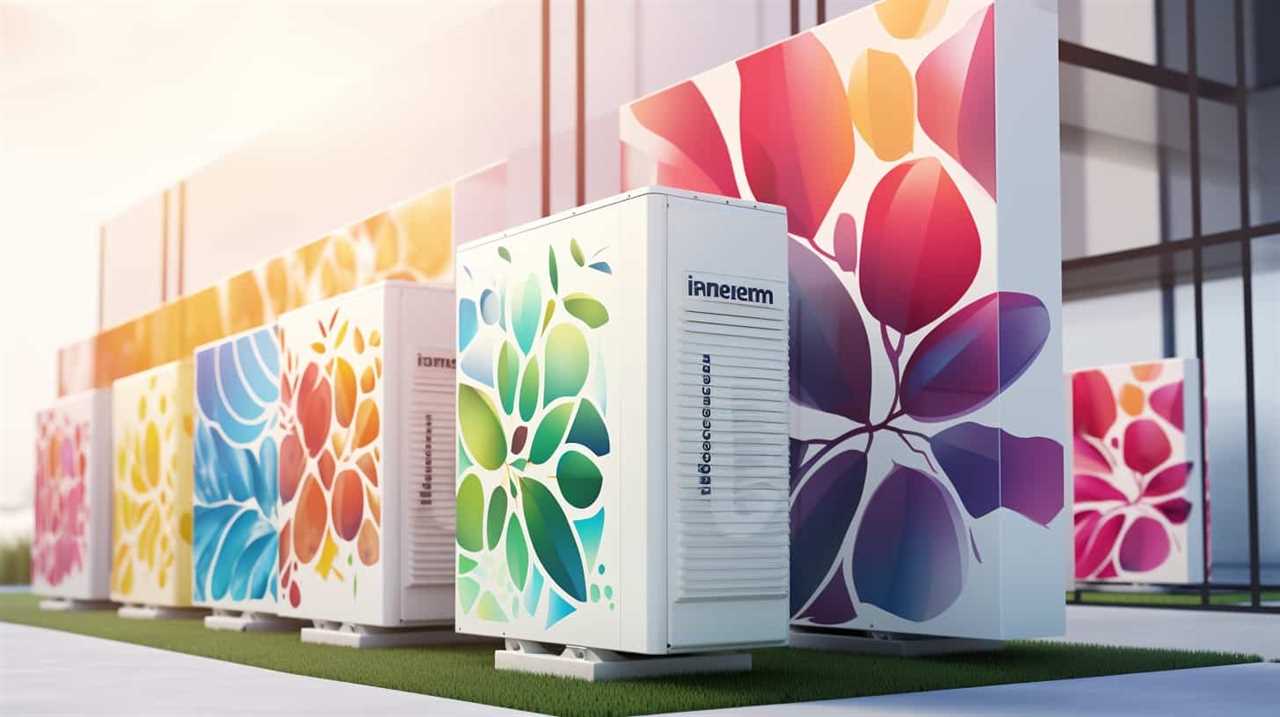
Can a Heat Pump HVAC System Be Used for Both Heating and Cooling Purposes?
Yes, a heat pump HVAC system can be used for both heating and cooling purposes. It offers high efficiency by using electricity to transfer heat instead of generating it, but has disadvantages such as high initial costs and reliance on outdoor temperatures.
What Are the Potential Drawbacks or Limitations of Using a Heat Pump HVAC System?
The potential drawbacks or limitations of using a heat pump HVAC system include higher upfront costs, lower heating capacity in extremely cold climates, and the need for regular maintenance. However, the pros include energy efficiency, lower operating costs, and reduced environmental impact.
Are There Any Specific Safety Precautions to Keep in Mind When Using a Heat Pump HVAC System?
Safety precautions and maintenance tips should be followed when using a heat pump HVAC system. Regularly clean and inspect the system, ensure proper ventilation, and keep the area around the unit clear. Regular professional maintenance is also recommended.
Conclusion
In conclusion, by understanding the workings of heat pump HVAC systems and selecting the right size for your home, regularly maintaining them, setting the ideal temperature, utilizing programmable thermostats, and ensuring proper insulation and air sealing, you can achieve optimal efficiency and energy savings.
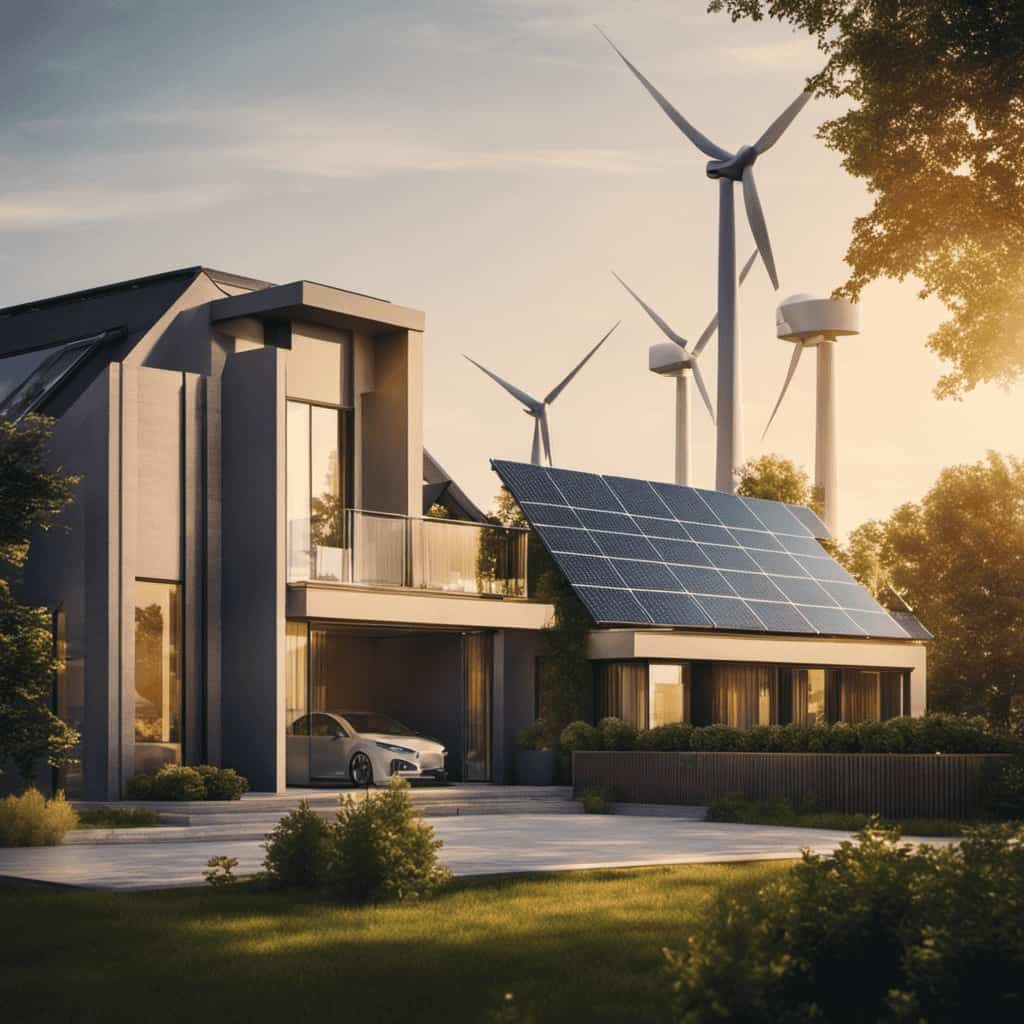
Just like a well-tuned machine, a well-maintained heat pump HVAC system can keep your home comfortable and your energy bills low, making it a smart investment for the long run.

